Listen:
Check out all episodes on the My Favorite Mistake main page.
Joining me for Episode #3 is Karyn Ross, an author and consultant who also works in my field of the “Lean” management system. Today, Karyn will discuss her favorite travel-related mistake and what she learned. We'll also talk about how we can be kind in our coaching of others (and how we can be kind toward ourselves when we make mistakes).
Her books:
- The Toyota Way to Service Excellence: Lean Transformation in Service Organizations
- How to Coach for Creativity and Service Excellence: A Lean Coaching Workbook.
- Think Kindly – Speak Kindly – Act Kindly: 366 Easy and Free Ideas You Can Use to Create a Kinder World…Starting Today!
- Big Karma and Little Kosmo Help Each Other
Karyn signed a deal with a publisher for a new book, The Kind Leader — available now
Please check out Karyn's non-profit, The Love and Kindness Project Foundation.
Watch the Full Episode:
Check out Karyn's colorful suitcase in this update video she shared in March 2024:
Quotes:
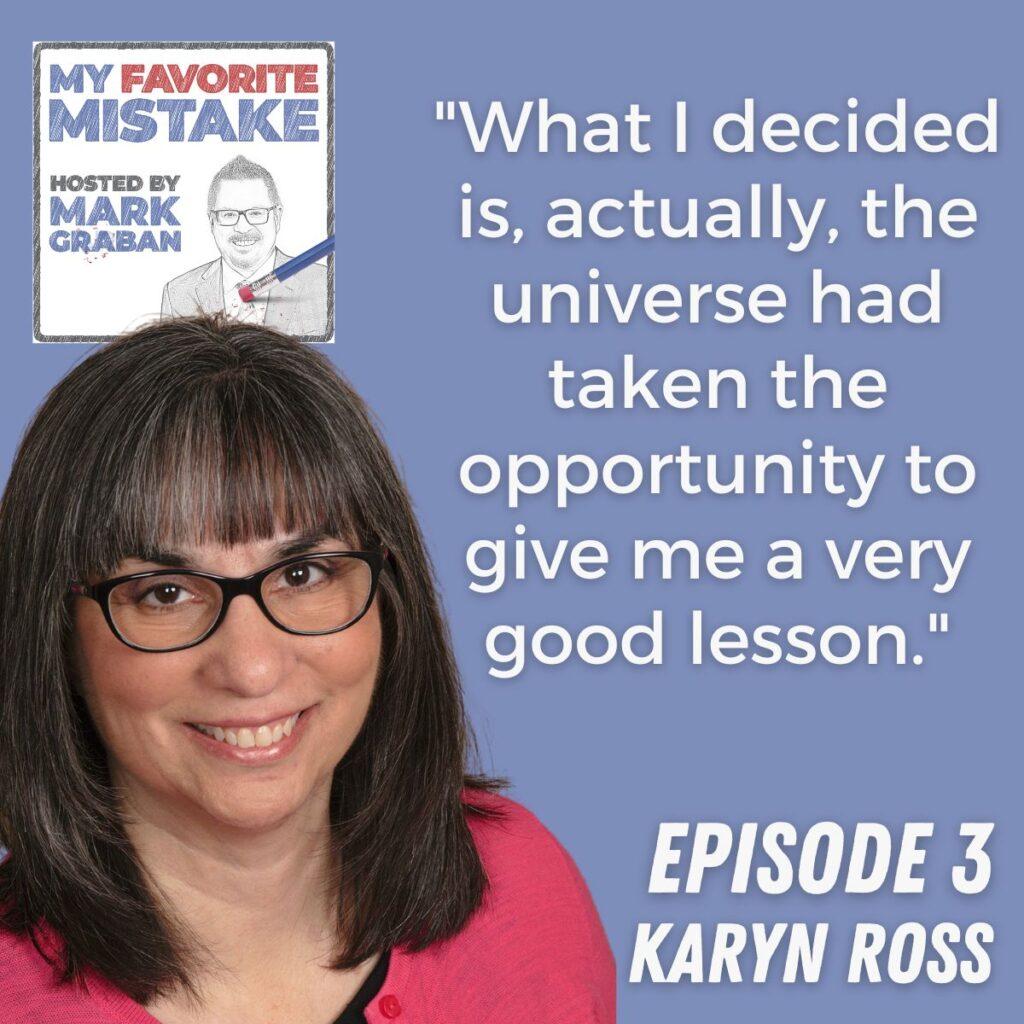
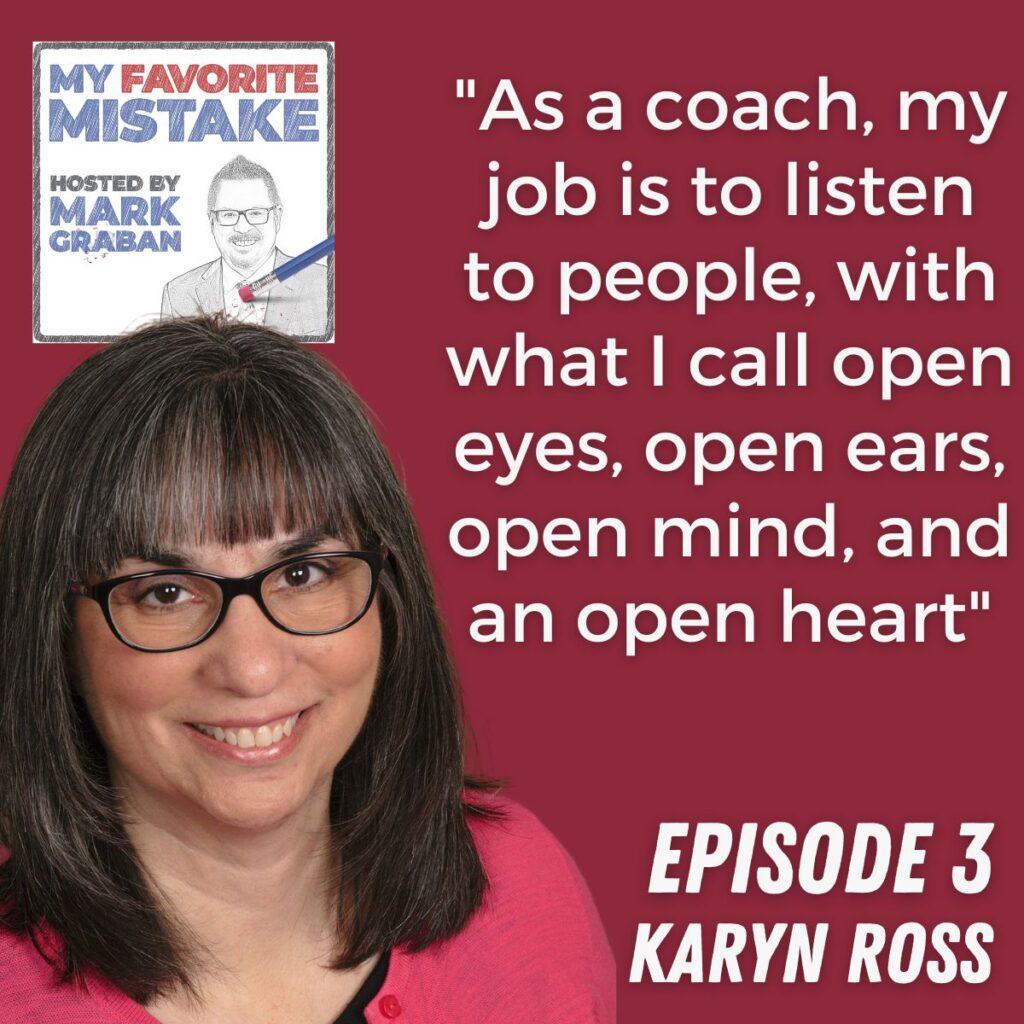
Subscribe, Follow, Support, Rate, and Review!
Please follow, rate, and review via Apple Podcasts or Podchaser or your favorite app — that helps others find this content and you'll be sure to get future episodes as they are released weekly. You can also become a financial supporter of the show through Anchor.fm.
You can now sign up to get new episodes via email, to make sure you don't miss an episode.
This podcast is part of the Lean Communicators network.

Other Ways to Subscribe or Follow — Apps & Email
Karyn Ross On Her Favorite Travel Mistake & Being Kind To Oneself
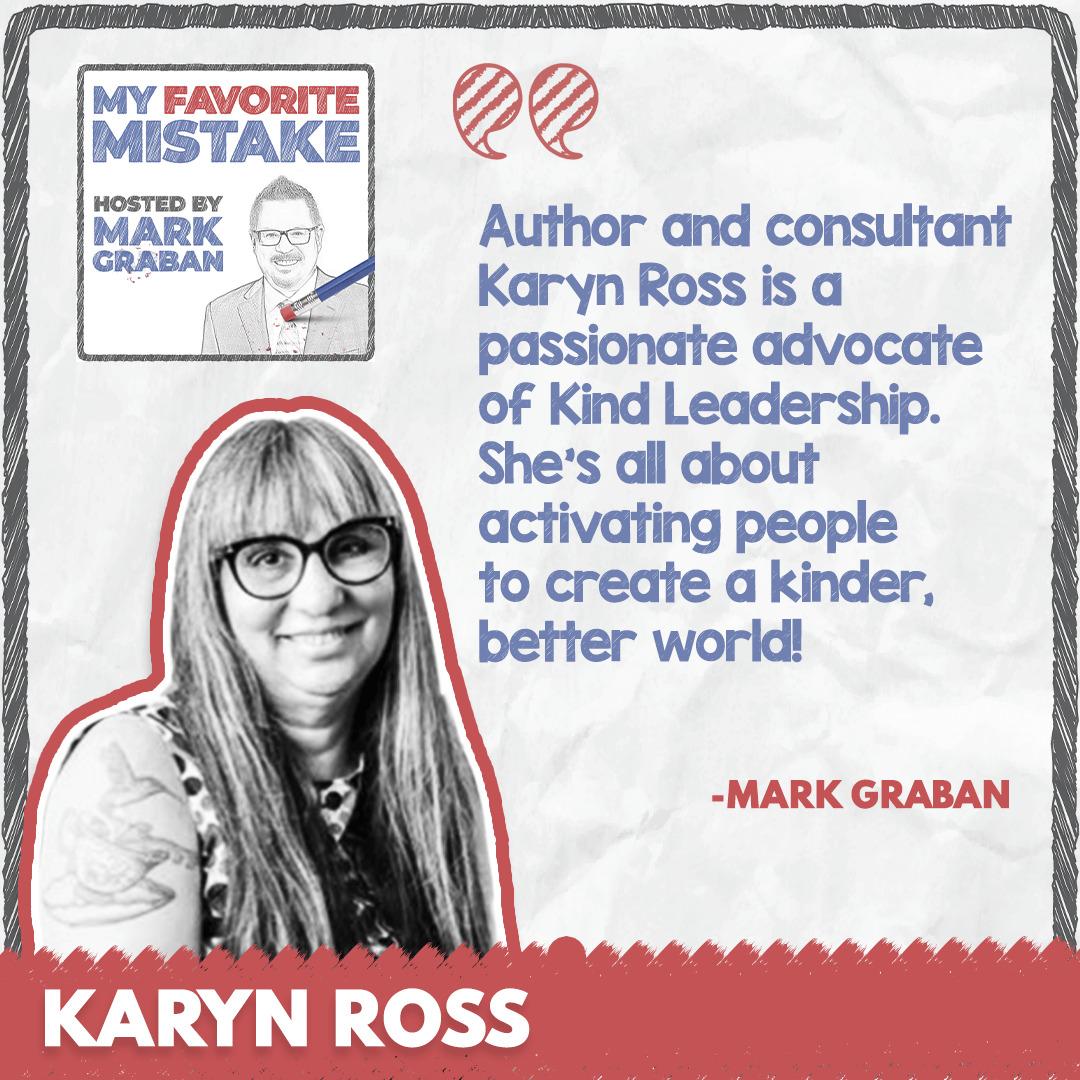
We are joined by Karyn Ross. Karyn, how are you?
I'm doing totally fabulous. How are you?
I'm doing well. Karyn is the co-author of The Toyota Way to Service Excellence: Lean Transformation in Service Organizations. She's the author of How to Coach for Creativity and Service Excellence. A little bit later on, I'll ask you, Karyn, to tell us about your upcoming book that you've just signed a deal for. We'll call that a teaser if you don't mind. Thinking back, what's your favorite mistake?
First of all, I love this topic. When you invited me to be on this show, one of the things that was fun was thinking back on all of the different kinds of mistakes that I've made. People who follow me on LinkedIn will see that I regularly post about stuff that doesn't go right. I thought about this one story, and I wanted to share it with you, Mark, and everybody who reads, because it was significant in my life.
Although we're now not traveling due to COVID, for the last several years, I traveled almost full-time, both for Karyn Ross Consulting, my own business and also for some of the corporate organizations that I worked with before. In the last corporate job I had, before I started working for myself, I traveled all around the USA. I traveled to a different place every week.
O'Hare Airport is my home away from home. I'm sure you have this, too. When you go to the airport, people who travel frequently, we're just existing in the airport. We're doing all kinds of other things. We have the flow. We know where to go. We know what to do. We do things in the same standard way. For some reason, and I can't remember what the reason was, I didn't follow my standard. That morning, I got to O'Hare and instead of checking my bag, which I always do because I have a problem with my shoulder, so it's not so easy for me to lift the bag up. I decided I'd keep the bag with me.
I went through security. I sat down somewhere near the gate, but not right at the gate, and I started checking my email. I got involved in checking email. Someone called me and it was a work problem that made me frustrated. I was frustrated because I thought the attitude of the person who was calling me was not the right Lean attitude. I heard that they called that my gate was changed. I got up. I was still on the phone complaining now to somebody else.
I walked to the gate and sat down. What did I realize after a few moments? I didn't bring my suitcase with me. It was one of those really nice, black travel, pro-expensive suitcases. When I realized I didn't have my suitcase, I got up and ran back to where I had been sitting. Was the suitcase there? No. I went and there's a place where there's police at O'Hare. I went and I told them the thing and they said, “Suitcases get stolen all of the time.” I went back and they said, “You have to go downstairs, baggage claim to report this.” I went and I did that. I went back to security.
I got on the plane without my suitcase. I just had my backpack for a week-long business trip. When I got to where I was going, I got off the plane and someone was there to pick me up and I said, “Hello.” “Where do we go?” “Anywhere. I will need to go to a shopping mall because all I have is this backpack.” I went and I bought a new suitcase and I bought a bunch of new clothes and toiletries. It's quite amazing when you think about it, what you pack for even one weekend, you think about what you might need. I was okay. I'm a person who does a lot of reflection. I thought about this.
When I got home after the week, something occurred to me, and this is why it was my best mistake ever. It occurred to me that the reason that my suitcase had been stolen was that I was paying attention to something that I didn't need to be paying attention to. I didn't need to be frustrated. I didn't need to be angry. Instead of being in the moment where I was, I was distracted from the important things in life by something that was unimportant.
At that moment, the universe had taken the opportunity to give me a very good lesson. When people ask me about it, they say, “Someone stole your suitcase.” I said, “No. No one stole my suitcase. The universe took my suitcase to remind me that we always have a choice.” We can think negatively and unkindly and be frustrated with people when we probably don't know the full extent of the situation. We can choose to be in the moment to understand that person has their point of view. I have my point of view when I get to where I'm going, instead of complaining about that person. I could call them. I could talk to them. There's a variety of different things I could do, but I could keep my mind on the moment.
[bctt tweet=”What I decided was that the universe had taken the opportunity to give me a very good lesson.” via=”no”]
When I got home, I got a different suitcase. The different suitcase was a beautiful colorful suitcase that said happy, nature, peaceful, and free on it.
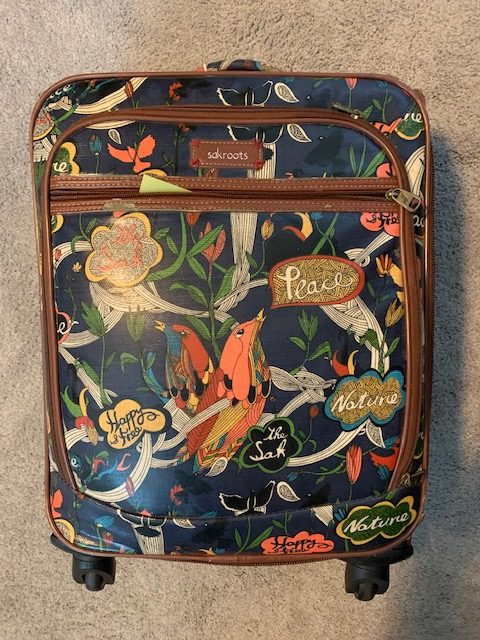
I amended my standard and I stopped checking my suitcase and I started carrying my suitcase with me. Every time I looked at it, it reminded me, no matter where I was, to keep my mind and my attention on the important things. Can you imagine how many conversations I had with people who came up to me who fucked up my suitcase and said, That's it.” I told them all this story. That's my best mistake.

It's good to hear about the reflection and the learning because it's easy for us to beat ourselves up when we make a mistake. I almost lost a suitcase at an airport once. I remember it fairly vividly. It was Grand Rapids, Michigan, which is not a very large airport. It was probably within a year of 9/11. This must have been in the year 2002 when there was especially vigilant awareness of an unintended bag. They still make announcements in the airport all the time about not leaving your bag unattended.
I had somehow wandered off without my suitcase. I don't remember why. It was probably a matter of distraction and thinking about other things. I caught it soon enough. I ran back over to where it had been, and police officers were just getting to the bag. I got a bit of a scolding of, “Don't do that again.” To be more present and mindful is easier said than done. What are some other tips that you've learned to help turn that goal into a reality of being more at the moment? That's something I could use help with. I'd be the first to admit.
I use a lot of different kinds of visual management. All of the things that we teach other people, they help us, too. You might think that all of my bracelets are a fashion statement, and some are. A lot of them have sayings on them. This one says, “Purpose.” This is from The Love and Kindness Project Foundation. This one says, “Create.” This one says, “Everything will be all right.” I can look down and I can see these and that reminds me.
I, in general, have something on my phone screen that is something for me to think about and remind me of. This says, “Nothing exists as it appears. Nothing appears as if it exists.” That's the Dalai Lama. Every day, I practice being present at this moment. Also, for Lean, when we tell people to go see, we can't go see if our eyes aren't open to what's happening in front of us. Everyday practice.
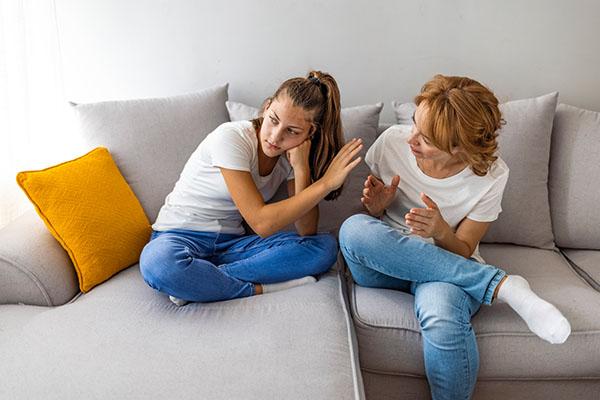
We might have a lot of readers who might not be familiar with what you or what I would mean professionally by Lean. Again, one of Karyn's books co-authored with Jeffrey Liker is titled, The Toyota Way to Service Excellence, and the subtitle is Lean Transformation in Service Organizations. In a nutshell, how do you explain what this Lean approach or what a Lean transformation means?
The very simple way I explain it is by helping people create better, more effective, and more efficient ways to work and serve customers. It's a set of practices that are very simple to help us think about what our customers need and want. Go see what's happening and then make sure that we're creating the ways to work so that our customers get what they want when they want it right the first time.
Your other book is again, How to Coach for Creativity and Service Excellence. The question I want to ask is, in terms of coaching, how would you recommend a coach help themselves be more present and mindful? How can a coach help the person that they're coaching to be more present during that coaching interaction? What are some thoughts you have on that?
I love that question because I think coaching helps both the coach and the person who's being coached be in the moment. As a coach, my job is to listen to people, with what I call open eyes, open ears, open mind, and an open heart. That means, while the person I'm coaching is talking, I'm not thinking of the answer. I'm not thinking of what I want to tell them. I'm thinking and listening about what they're telling me so that I can respond and ask them the next question that will help them think about what to do to solve the problem they're working on.
[bctt tweet=”My job is really to listen to people with what I call open eyes, open ears, an open mind, and an open heart.” via=”no”]
I coach people in a very particular way, 3 times a week, 15 minutes at a time. We have one short topic and then the person goes and does the work, 15 minutes between those. Again, daily practice. The reason I say fifteen minutes is because we have to build up the discipline with small things, to be able to do something longer. If we practice something for fifteen minutes every single day, in a very short amount of time, we will improve.
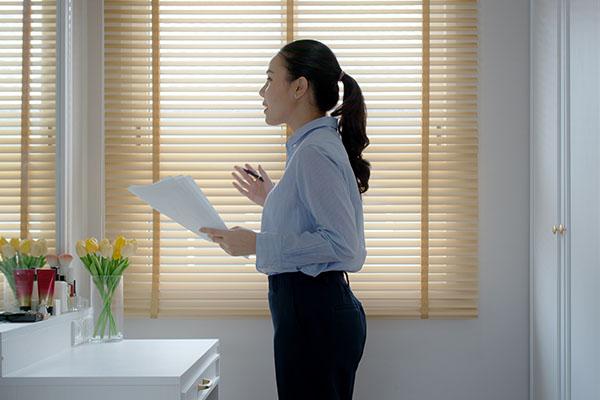
What I'm going to ask everybody is to go home. You don't have to coach somebody. For your spouse, your friend, or your child, sit down and just say, “I’m going to listen.” Set your timer on your phone for fifteen minutes. You might find that fifteen minutes is too long at first. Try five minutes. If that's too long, try two minutes. If that's too long, try one minute. Practice.
What you're saying reminds me of a psychologist that I've interviewed, Robert Moore. He's written some books about the brain and continuous improvement. What you're recommending is similar to what he teaches about starting with baby steps. If a change seems to be too large, even if it's positive, even if we tell ourselves this would be positive, we can trigger the amygdala and the fight or flight response and end up not trying because we think there's a chance we might fail. Making that change smaller is a way of trying to shortcut some of that cycle and prove that you can do it a little bit and then build upon that.
Think about how many people on January 1st, every day say, “I'm going to exercise for an hour a day.” Why don't we say, “I'm going to exercise for one minute a day.” Who made up the rule?
That's exactly what Professor Moore recommends. He says the success rate with weight loss is much higher when somebody is given the advice. He starts at 30 seconds. Get up off the couch during a commercial. Once you've proven to yourself you can do it for 30 seconds, there's a positive boost and then you can keep going and building up from there, as opposed to telling somebody you should start with 30 minutes, which ends up being a path to failure.
Like all things, and this really goes back to the topic of the show, lots of times as people, we give up too easily. Even in the Lean world, what we talked about, plan, do, check, act, which are those incremental steps that we're going to take, we think, “Here's this thing that I want to do. I'm going to try one thing and it's going to be successful. If what I want to happen doesn't happen, I might try a second thing, but after that, I'm out of options to try and I've just failed.”
I don't look at it that way. Some days, I'm super good at staying in the moment and paying attention. Some days, I'm more distracted. Some days, my suitcase is stolen from O’Hare Airport, but it doesn't mean I give up. I look back and I say, “What can I do to work on this again?” We have a whole lifetime we've been given to practice and learn things. There are things that I've been working on since I'm a child, and I'm still working on them now.
The final thing I want to touch on. You've signed a deal for a new book. I'll let you tell the readers the title that you're working on.
I'm super excited. The new book is called, The Kind Leader and it's a practical guide to leading with kindness, as well as the Lean work that I do. I also have a foundation called The Love and Kindness Project Foundation. That foundation fosters projects that create more love and kindness in the world in tiny little ways. One of the things I've really noticed is there's a lot of unkindnesses going around in the world, unfortunately.
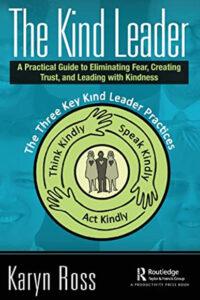
Whether we're in leadership positions at work or not, we all lead someone, whether it's at home, on a team of kids that we coach, or things like that. We all have the opportunity to lead with kindness because what leaders do and say, the people they lead follow. I'm super excited. The book is going to be out in late spring or early summer. I have a newsletter that people can sign up for and I'll be sending out a weekly tip and information that I'm learning from my research and writing because we don't need to wait to lead with kindness. We need to start now.
That's a great thought. KarynRossConsulting.com is the webpage. Final question, maybe just to tie everything together, when we make mistakes, we may have a tendency to be unkind toward ourselves. What are your thoughts about leading oneself, being kind, and staying in a mode where we can reflect and learn from a mistake instead of just being upset at ourselves?
What I would suggest is, at that moment when your inner voice starts that track of all those unkind things, to step out for a moment and say, “If this happened to someone else, if this happened to my friend, if this happened and they came to me and told me this, what would I say to them?” Chances are, what you're saying to yourself is not what you would say to them.
Say out loud the words that you would say to someone else. If they came and told you about that mistake because then you'll hear those words. We have to be kind to others. We have to think kindly, speak kindly, and act kindly to others. We need to think kindly, speak kindly, and act kindly to ourselves, as well. It's all a new mistake and it's okay. You'll get a new suitcase.
You'll get some new clothes.
You'll get a lesson, which you can learn from and carry with you and help others for the rest of your life.
It's great advice and it's very kind of you to share that. It's kind of you to be here as a guest on the show. Again, we've been joined by Karyn Ross. Karyn Ross Consulting is her company. Her books that you can get now are The Toyota Way to Service Excellence, and then her follow-up, How to Coach for Creativity and Service Excellence. What's the website for the Love and Kindness Project?
Love and Kindness is at LoveAndKindnessProject.org. We have two books from the foundation, Think Kindly – Speak Kindly – Act Kindly which is free and easy ideas for you to use to start your kindness practice, and for those of you with kids, Big Karma and Little Kosmo Help Each Other. These are my dog and cat. Honestly, if they can get along and help each other, there is no reason any of us cannot.
I'll invite everyone to go check that out. Thank you for making sure we mentioned all of your books, Karyn. Thank you for everything that you do. You're someone I consider to be a positive influence in my life, so thank you for that and thank you for joining us.
Thanks so much.
Important Links
- Karyn Ross – LinkedIn
- Karyn Ross' Author Page – Amazon
- Karyn Ross Consulting
- The Toyota Way to Service Excellence: Lean Transformation in Service Organizations
- How to Coach for Creativity and Service Excellence: A Lean Coaching Workbook
- Think Kindly – Speak Kindly – Act Kindly: 366 Easy and Free Ideas You Can Use to Create a Kinder World…Starting Today!
- Big Karma and Little Kosmo Help Each Other
- The Kind Leader
- The Love and Kindness Project Foundation

